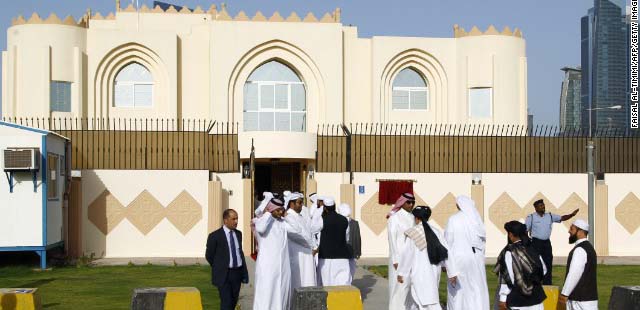The High Peace Council has announced its preparation to set off for Doha to initiate peace negotiation with Taliban representatives. On June 18, Taliban formally inaugurated their first political office in Qatar after its collapse by US-led military intervention in 2001. The trappings of the ceremony and brags reflected in voice tone of Taliban representative extremely irritated officials in Kabul.
The office was inaugurated in the presence of deputy to foreign Ministry of Qatar; the name of the office was clearly written “Office of Emarat-e-Islami”; the white flag, the symbol of Taliban regime, was hoisted; and Taliban representatives frankly said that their armedstruggle will continue, and the liberation of the country was their religious obligation.
Such activities indeed were enough to send shock down to spine of those who are unfamiliar with political situation of the country. Many come to doubt about the power of Afghan government to stand on its own feet after the foreign military withdrawal. Questions like whether the government was able to cope with militancy independently were answered with dazed eyes.
Because the very inauguration of the office rapidly raised this question in the minds of thousands: what is going in Afghanistan? The international community along with Afghan government failed to win war at the battle ground? If not what is the need for a peace talk? If yes, how powerful militants are and what portions of Afghan civilians support them?
Undoubtedly, with implicit acceptance of foreign allies regarding the name and inauguration process have further fuelled such suspicion. And good for Afghan officials and their quick reaction to some extent restored the undermined prestige of the government. The name of Emarat-e-Islami changed into Taliban Political Office, and the white flag also was dragged down.
Meanwhile the political office has huge advantages for Taliban. It has given broader space for the group to let their supporters in the remote areas in the region hear them and also start bargain with Western countries interested to get rid of the current security dilemma of Afghanistan.
In spite of all that, Afghan people worriedly support peace negotiation and the government also has talked of practical steps to motivate militants lay down arms and join the democratic process. But what certainly were unacceptable for government as well as for people was haughty inauguration and the snobbish remarks. Such move was widely interpreted as diplomatic failure of the government that failed to use its diplomatic tie with countries who implicitly or explicitly kept quiet.
The question is why our allies did not stand against a clever move of Taliban militants in spite of their commitments to Afghan people and the government? I think part of the problem lies with lack of a defined foreign policy, particularly against militants. Once they are labeled as dissent brothers and later on become the stooges of foreign countries disrupting the security situation.
President Karzai has often said that the United States is fighting terrorism and insurgency at the wrong battle ground. If it really wanted to fight terrorism and insurgency, it has targeted their hideouts inside Pakistan. On the other hand, the increasing drone attacks of US inside Pakistan which visibly proved effective in dealing detrimental effects on Taliban hideouts. The drone attacks brought down many key leaders of militants who are responsible for numerous suicide bombings in the country, including Baitullah Masood.
Mr. President also has strongly stood against aerial attacks on accounts that air strikes might cause civilian casualties. Even in the ceremony held days ago for transition of security responsibilities to Afghan people, he voiced out that air powers should not be used. Indubitably, the air strikes are the most effective and cheap operations that can deal serious blow to militant establishment through hunting down their leaders.
Maybe in the future, the US is willing to carry out drone attacks in the country similar to what it is doing in Pakistan to go after masterminds of al-Qaeda linked militants. In addition, without depending on NATO air power, the mission of Afghan security forces will be so tough. Militants can easily ambush them, using civilians as human shield without fear of being spotlighted by fighter jets.
Such opposition and inflexible stance has disappointed our Western allies. They think that counting on Kabul as new potential strategic ally in the region may end up to sorrows due to some uncalculated, temporary and emotional policies.
Thus, they are trying to avoid strategic and political investment which certainly expands their gaps with old allies like Pakistan. From this prospective, peace negotiation not only ensures their sound withdrawal but also credits Pakistan that is in view that anything for Afghanistan should be passed through its political channels.
Definitely, the situation is under control of Pakistan because all representatives of Taliban in Qatar have gone through Pakistan. Thus, for the return of the momentum, the government should hold very practical steps to improve and tighten relation with our Western allies.
They should believe that Afghanistan is highly interested to remain as close and strategic ally in the region. And it will remain committed to its promises and will not compromise democratic achievements during past 12 years. Such an approach on one hand prevents the process of re-marginalization of the country from the spotlight of international community attention and on the other hand disappoints our neighbors who are in the pursuit of opportunities to build a proxy government.

